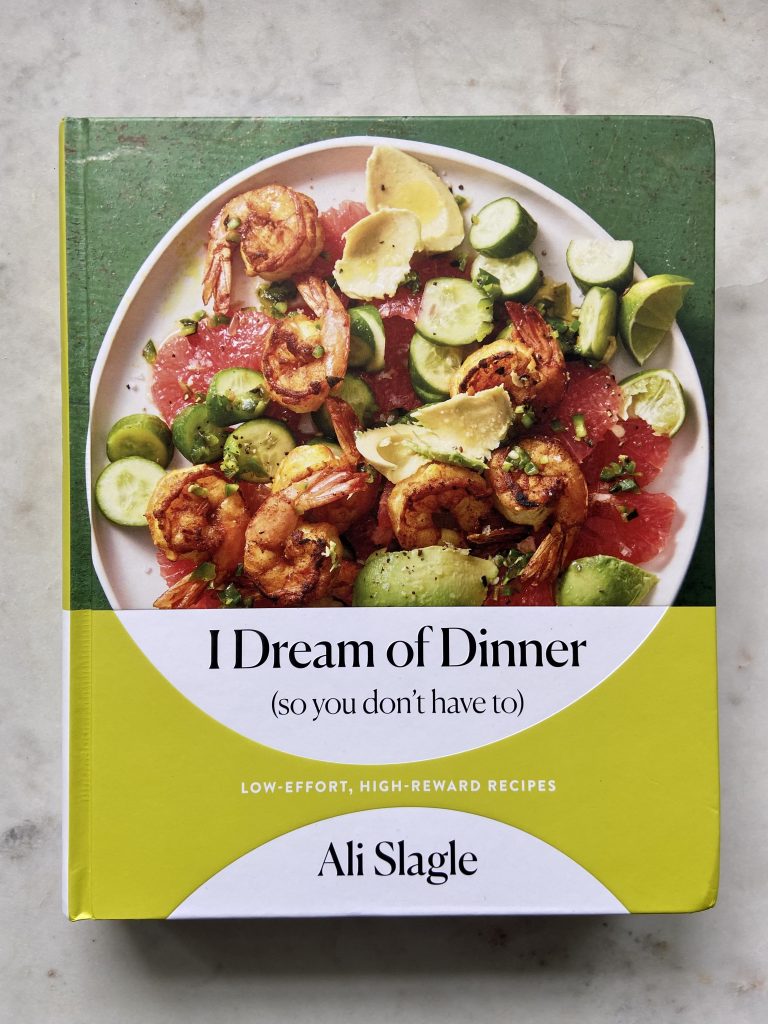
Like a lot of people, my younger daughter, Abby, discovered cooking during the pandemic. For her it wasn’t about project cooking — she didn’t bake a single loaf of sourdough — it was much more about self-care, about ensuring that she had at least one moment of joy in a day spent mostly staring at her friends and teachers over Zoom. She became particularly adept at making pastas, and seemed to be always studying techniques on YouTube and saving recipes from her favorite instagrammers. But at a certain point I started noticing that the answer to “Whose recipe is this?” was almost always the same: “Ali,” she’d say, throwing her gnocchi into a sizzling pan to make it crispy, a technique I’d never seen before that moment. The one-pot pasta with lemon and ricotta? Ali. That addictive “Midnight Pasta?” Ali.
Ali is Ali Slagle, a contributor to the New York Times and The Washington Post, and was of course on my radar, too for how her recipes are so unpretentious and cookable (sorry to use that word but, they just are!), and always somehow exactly the thing you feel like eating. It goes way behind pasta, too. Consider her Crispy Sour Cream and Onion Chicken which begins “Picture sour cream and onion dip slathered on chicken cutlets, dredged in panko bread crumbs, and fried until crisp like a potato chip, and you’ll envision this recipe.” (!!!) Her first book, I Dream of Dinner (so You Don’t Have To) is out this week, and not surprisingly, it’s filled with more of the same. Like way more. All-Corner-Pieces Baked Pasta, Fish & Chips Tacos, Egg & Cheese Sliders, Cheesy Bread Potpie, Mushroom “Orzotto.” I mean, how fun does all that sound? You can see why the kid in all of us would be drawn to her recipes. In honor of the book’s publication, here’s Ali interviewed by my daughter, Abby Ward, now a freshman in college.
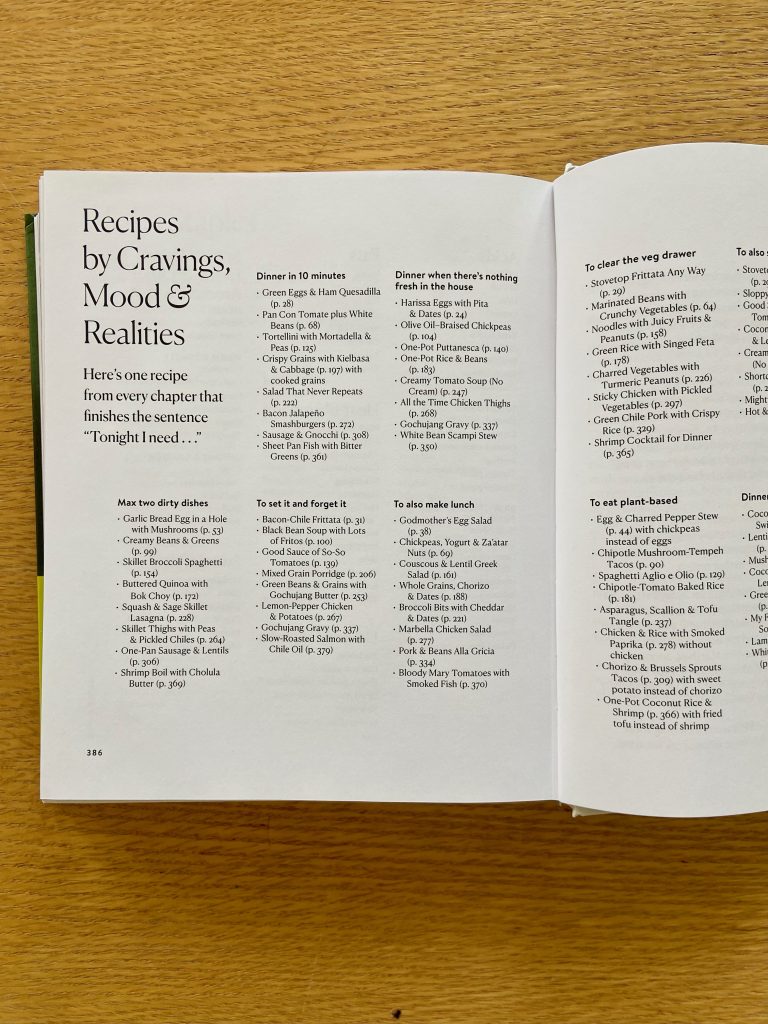
Abby: First off, I just wanna say I love all of your book obviously, but I was looking through the back section and I want to cut out and post all of the last pages here and post on my fridge if I get a room or suite with a kitchen next year. The ones that suggest meals for specific moods [above] or for when you don’t have enough food in the house and stuff. I loved that, it’s so smart.
Ali: At first that section was like double the length. Like I had a ton of ’em. So I had to give up some of those things, unfortunately, but I’m glad you find what’s there useful. I really wanted the book to have a robust index.
Abby: My first question is, are there any recipes in this book or otherwise that you would specifically recommend to somebody who’s learning how to cook?
Ali: I think when you’re first learning how to cook, it’s always nice to start with either something you really like to eat or variate on something that you might know how to cook. So I think, I don’t know what the first thing was that you learned how to cook, but I feel like for a lot of people it’s often a box mac and cheese or ramen. Both of those use a pot of boiling water, so what else can you boil and turn into dinner? Which is kind of why I organized the book by technique. Because I believe that once you become familiar with a technique, you can see what other ways to use it. I feel like that’s a natural way to learn how to cook.
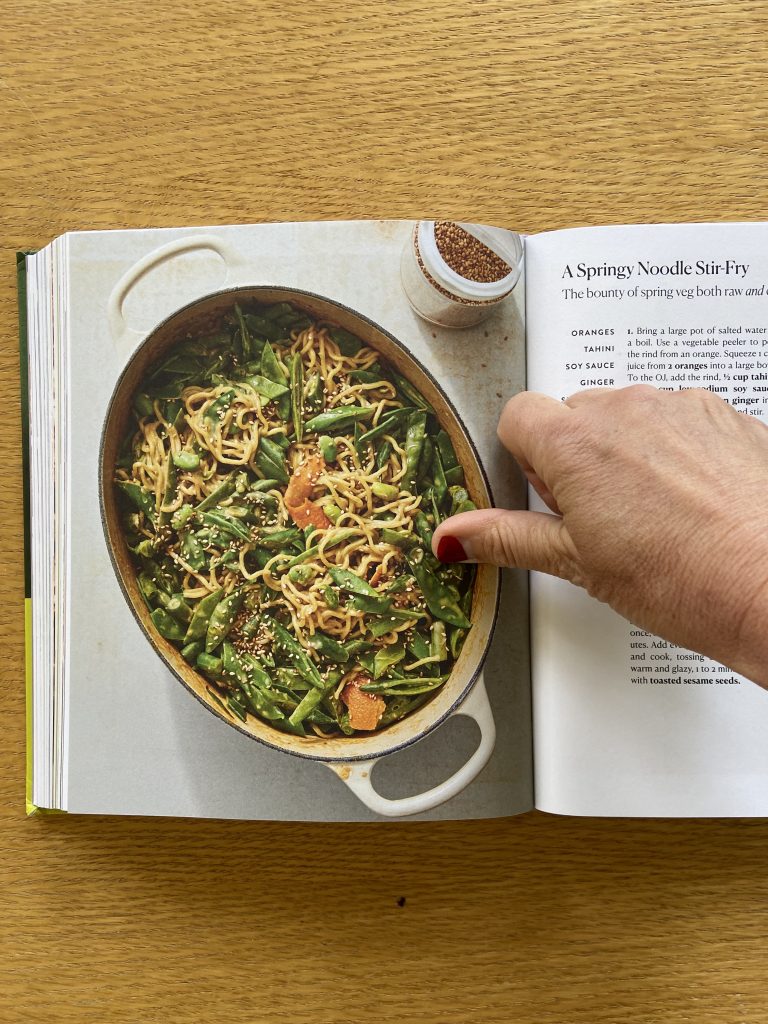
Abby: Yeah, that makes sense. Would you say the book is for beginners in general? There are really not a lot of ingredients called for in these recipes, hardly ever more than five?
Ali: I think who I had in mind for the audience for this book were people who don’t necessarily consider themselves cooks or aren’t like your mom, who’s like always thinking about food and what to make for dinner. I think especially since the pandemic, everyone has had to feed themselves and cook for their health, so my goal definitely was to appeal to all levels of cooks, because everyone needs dinner ideas.
Abby: Yeah. I think that’s really true. I know so many people who didn’t cook before the pandemic and now like me, I became really into it. I think two years ago I would not have been interested in even doing this kind of interview.
Ali: What did you first like to cook when you started cooking?
Abby: During the pandemic I watched a lot of Bon Appétit videos. Since the test kitchen obviously wasn’t happening anymore, the editors would do these virtual demos in their home kitchens. Do you remember those? And there was one that was like nine chefs made their favorite pantry pasta. And I think I made every single one. Cause I would be in my house all day for online school and I would have one hour for lunch, and I decided to make it the most elaborate thing ever so it would be the highlight of my day. That’s kind of what got me into it.
Ali: I mean, I think that’s really the key when you’re beginning, like what do you want to eat?
Abby: I do love the pasta section from your book and was wondering what your favorite is.
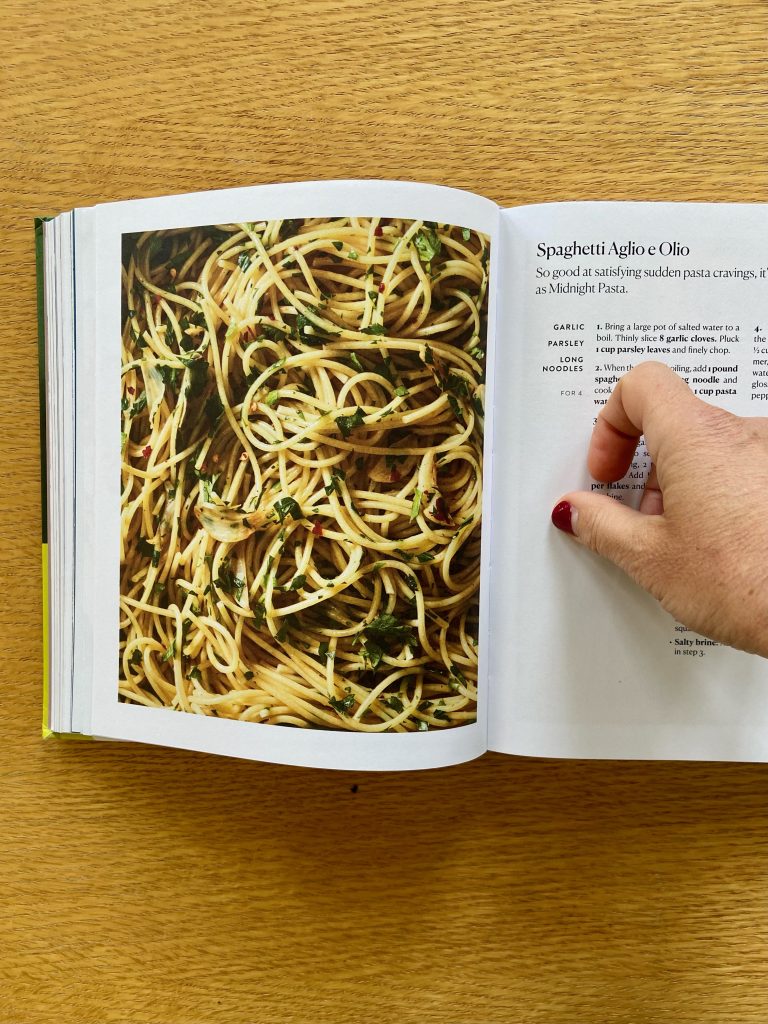
Ali: I think Aglio e Olio had to be in the book, just because it’s the quintessential pantry pasta to me. It’s basically simmering olive oil with garlic and red pepper flakes, and that’s your sauce. I think it’s a great formula for many pantry pastas just because olive oil, when it’s warm, it carries flavor. So you can bloom so many different things in olive oil to make a sauce. And if you don’t have garlic, you can use either ground or whole spices or scallions or there’s just so many ways to like turn olive oil plus one pantry flavoring into a sauce. In my recipe, there’s a lot of parsley in it cause I did try to incorporate vegetables or green things when possible, just because like hopefully some nutrition is happening at dinner, but I mean, if we’re being honest, parsley is not essential to the recipe.
Abby: That sounds so good. My friend was in Italy over spring break and he brought me back this really beautiful pasta and I was trying to think of a way to prepare it. I don’t wanna do anything too fancy to it, so that sounds like a perfect thing to do.
Ali: Definitely.
Abby: My next question is a little bit specialized for college students. What are some recipes or just tips in general for things to make in like a really under-equipped college kitchen?
Ali: Funny you asked that because I wrote a story recently about why I still cook like I’m in college. Cause I just feel like everyone has limitations when they’re cooking dinner, whether it’s financial or time or enthusiasm or equipment, and in college it’s like all of those things are happening at once. So I remember just making pasta, which I feel is like just a classic college food. We had like a big pot to boil water. I would make so many grain salads, and I think it’s just cause you can put beans in them or canned tuna or anything, and then add crunchy vegetables, which keep forever. But I still think I eat and cook like that — like I make a big pot of something and then just switch it up based on what produce I might have.
Abby: That’s good advice. And if you were in a dining hall and you had access to some of the things that we have, I’m just gonna list them: We have really good butter because we are in Vermont. We have really bad fake Parm, we have olive oil, we have pesto, we have okay marinara, and red pepper flakes. Like based on that, what kind of pasta would you assemble in the dining hall? What would you look for?
Ali: Oh my gosh. This is like “Chopped!” And we’re, we’re making this with pasta that is already cooked?
Abby: Yeah. It’s just like a really just like classic dining hall stuff, like penne or bow ties.
Ali: And do you have any sort of like meat, like pepperoni or…
Abby: Yes, there’s sausage a lot of the time.
Ali: So one direction would be like marinara plus a really flavorful meat, like sausage or bacon or something. And then if you like, like briny things like olive or capers, basically think about ingredients like that which add salt in a developed way. So you’re not just adding salt, there’s also umami a puckery briny thing going on. And you don’t have to cook that sauce to make it flavorful. Think too about heat like spiciness — like if you have red pepper flakes or even adding hot sauce. I feel like the way I survived college dorm food was by putting hot sauce on everything, you know? Also, if you have hot water like in the tea area, you can use that to make a fast pasta fagioli — just basically marinara sauce with a little boiling water, pasta, beans, and then like whatever vegetables, and the pesto…
Abby: Wait, that is a really cool idea, I’m gonna write that down.
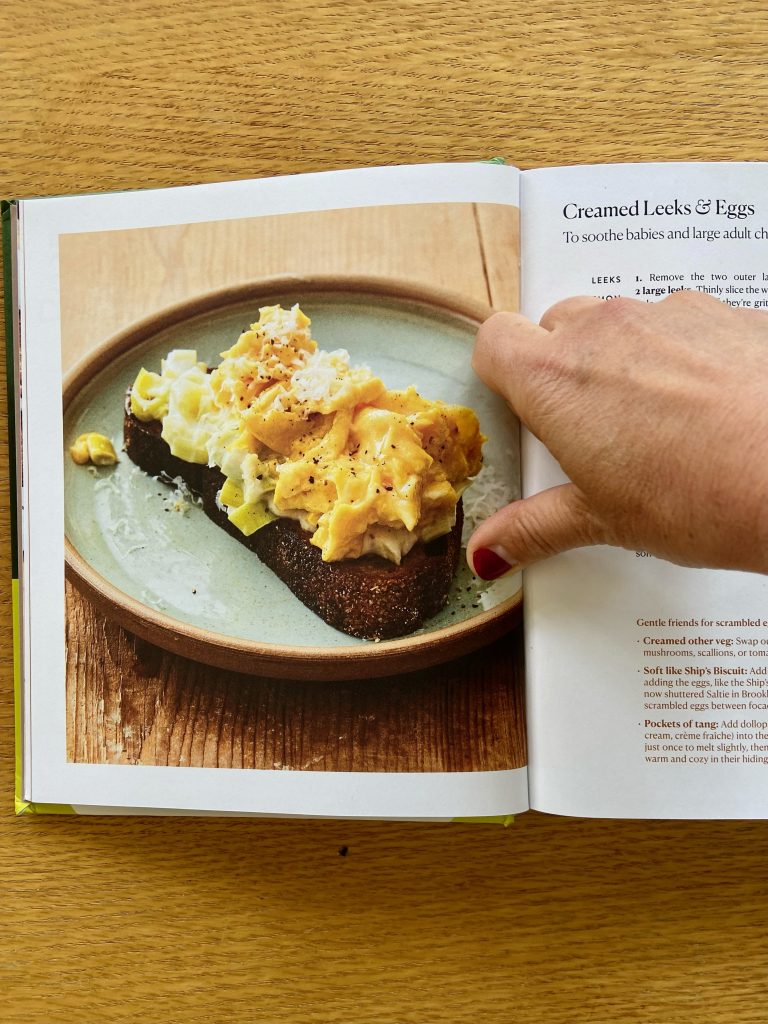
Abby: In your ideal day of eating, what would be your breakfast, lunch, and dinner? Like just three meals. This is my favorite question to ask people.
Ali: Oh, wow. Okay. Breakfast: Probably just like really simple scrambled eggs or a really crispy fried egg with really good bread, that’s it. And then for lunch. Hmm. Well, let me do dinner and then I’ll come back to my lunch. Dinner would be like, let’s say we’re we’re in the summer. So it would be either like pan con tomate or some sort of like Caprese or Greek salad and then a protein on the grill. Just some really simple grilled chicken and then maybe two salads. Yeah, ok so back to lunch. If I eat breakfast, I usually don’t eat lunch, but, I’m a fan of just tuna salad or an egg salad on good bread. I eat a lot of bread, just a lot of toast everywhere.
Abby: That those are good answers. That dinner really sounds like something my family would eat in the summer.
Ali: What would your day look like?
Abby: For breakfast would be some form of pastry, like a really flaky good pastry with really good fresh fruit — summer fruits like nectarine and cherries and peaches. And then, an iced latte. That’s my breakfast I feel like the breakfast is the only one I had figured out for sure, but my other meals would have to be pasta or sushi probably, but I don’t really care which one is which. The pasta would probably be Marcella’s bolognese. And then lunch, I would just say sushi because why not.
Ali: Yeah, that’s a great, I would also take your menu as my favorite menu!
Abby: OK, last question. How did you start cooking?
Ali: Well, I like you grew up in a family of cooks. My mom was always cooking, whether it was breakfast, lunch, or dinner or snack. So I think I learned just by watching her and then she had so many cookbooks, so I would always read cookbooks and experiment when I was little. And when I went to college, I had to figure out how to cook so I didn’t have to depend on the dining hall. And, then I had an internship at a cookbook publisher, so just reading so many manuscripts and cookbooks in progress helped a lot. When I was an intern, I was in publicity and marketing and then after I graduated, I went over to editorial. I learned so much during that time.
Abby: That’s cool. I’m trying to find internships and stuff right now. So I’m just curious how other people do it.
Ali: What are you interested in?
Abby: Well at the moment, I really wanted to find something in podcasting. I love podcasts. I have a radio show, but I would love it to be food podcast. I don’t really have a food podcast that I’m really into right now. Do you have any that you recommend?
Ali: I mean, I love Samin.
Abby: Oh! Me too.
Ali: That one to me was like just the perfect food podcast, cause the questions were so interesting and I learned so much, but then Food 52 has this network of podcasts, and they have been trying some new things. Like on Play Me a Recipe, someone will like walk you through a dish. I think that’s like a cool idea, it’s fun to hear the cooking. There aren’t really many podcasts where you hear the cooking and sounds, you know what I mean? Which I think is like how many of us watch cooking shows. Like it’s just babbling in the background.
Abby: Yeah that’s cool. Well thank you so much for talking to me. I really, really, really love your book, and I was not kidding. If I end up getting my suite next year with a kitchen, I’m gonna have those pages posted on my fridge.
Ali: Wow, that’ll make me really happy. Thank you so much. It was great to meet you.
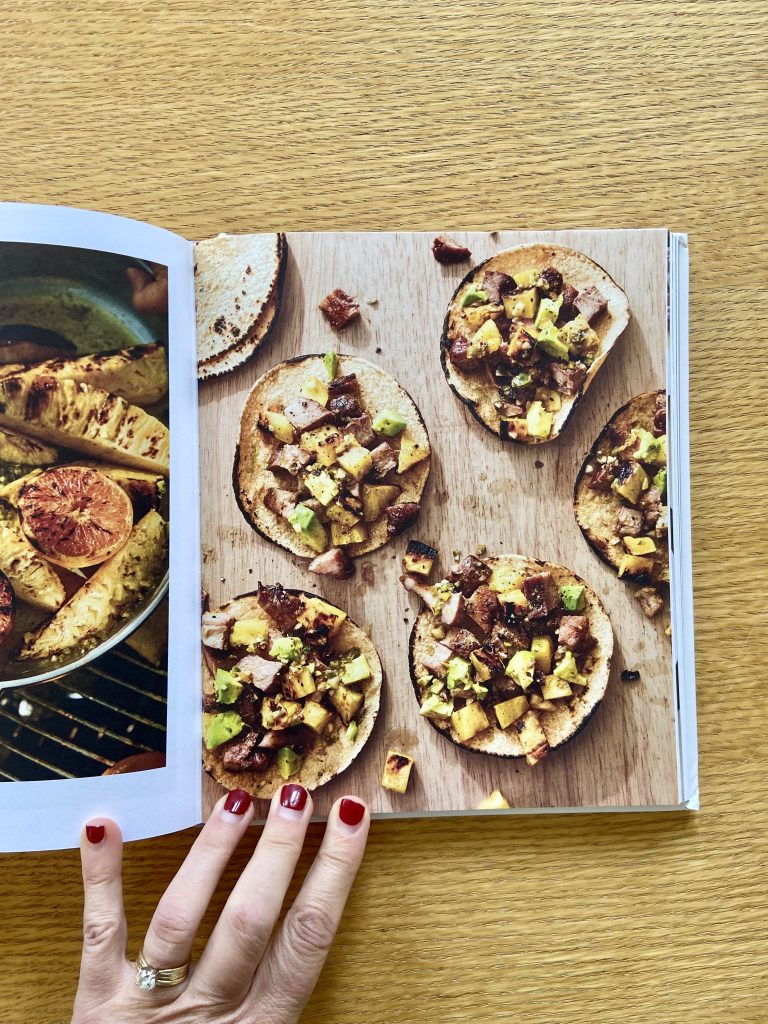
Thanks, Ali! We love your book! I Dream of Dinner is available wherever books are sold.
(Photos in I Dream of Dinner by Mark Weinberg.)

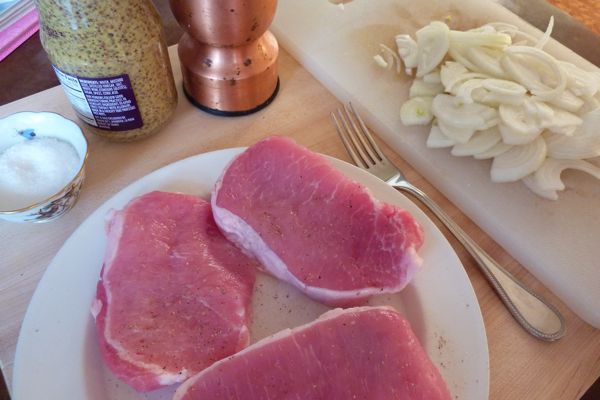

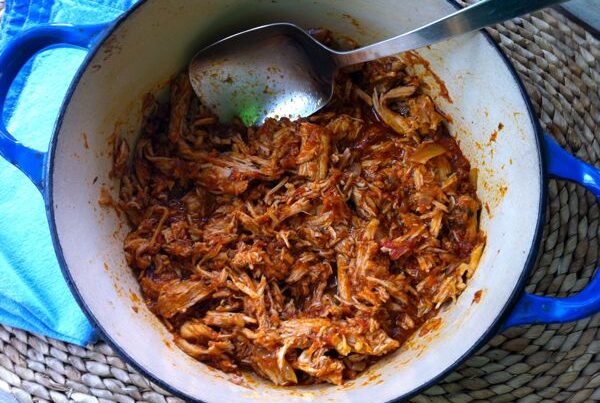
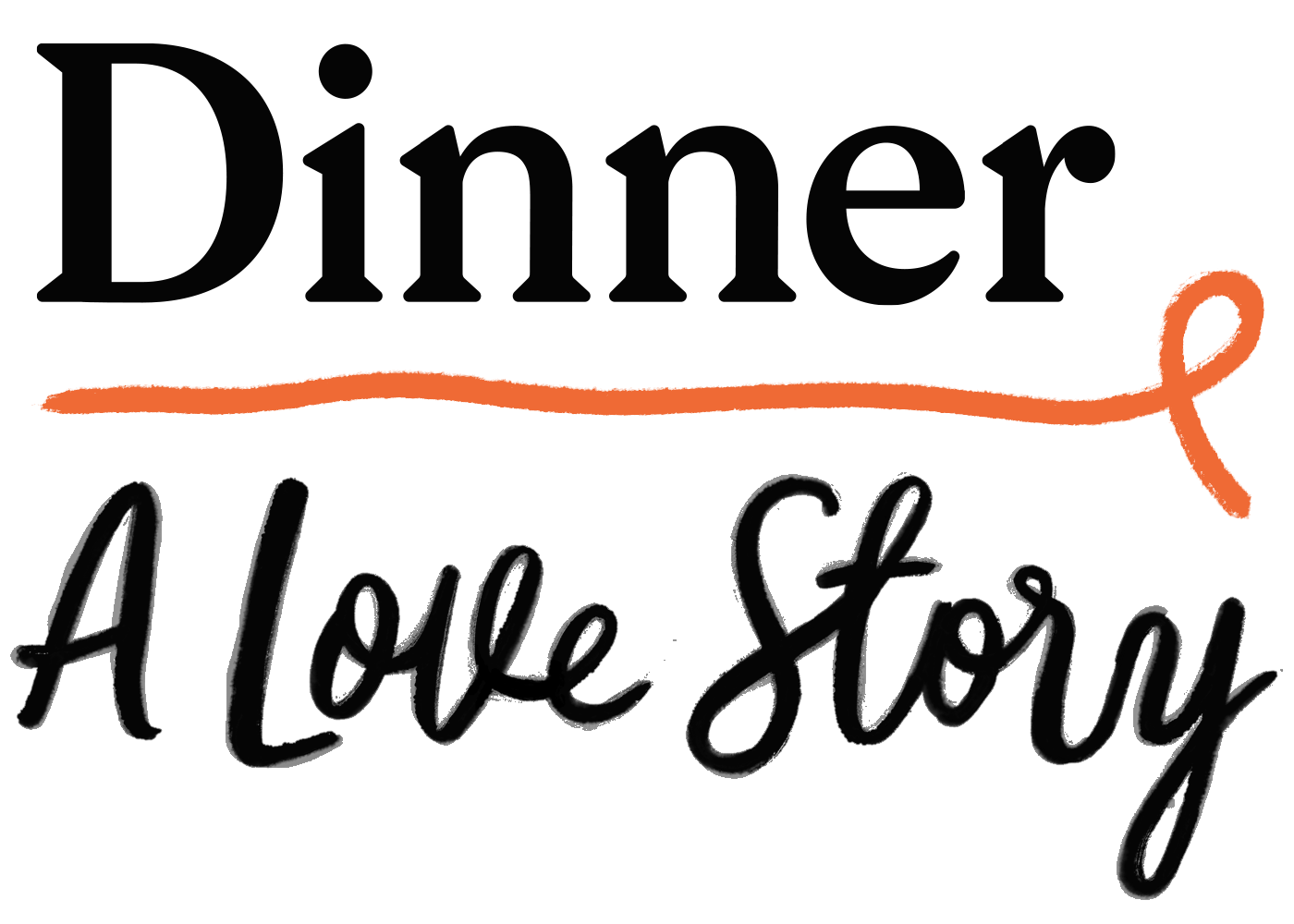
Great interview, Abby! And Ali – how gracious you are.
And Jenny – pretty cool mom move 🙂
Fun interview! And as for food podcasts, I like the BBC’s good food podcast.